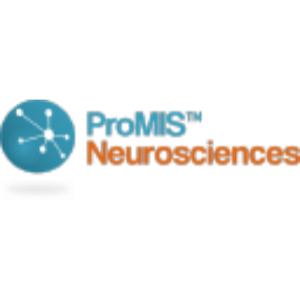ProMIS Neurosciences Reports Positive Top-Line Data from its Phase 1a Alzheimer's Trial
Rhea-AI Summary
ProMIS Neurosciences (Nasdaq: PMN) has reported positive top-line data from the first four cohorts of its Phase 1a clinical trial of PMN310 in healthy volunteers for Alzheimer's disease. The results showed:
- A favorable safety profile and tolerability across four ascending dose levels
- Dose-dependent levels of PMN310 antibody in cerebrospinal fluid (CSF)
- Potential for target engagement in Alzheimer's patients
PMN310 was well-tolerated with no serious adverse events observed. The antibody demonstrated dose proportionality in CSF and a half-life of approximately 25 days, supporting monthly dosing. ProMIS plans to advance PMN310 into a Phase 1b study in Alzheimer's patients in the second half of 2024.
Positive
- Favorable safety profile and tolerability of PMN310 across four ascending dose levels
- Dose-dependent levels of PMN310 antibody observed in cerebrospinal fluid
- No treatment-emergent serious adverse events reported
- PMN310 demonstrated dose proportionality in CSF at both days 3 and 29
- Half-life of PMN310 in CSF was approximately 25 days, supporting monthly dosing
- Lowest dose reached greater than 100-fold molar excess compared to expected oligomer levels in CSF
Negative
- None.
News Market Reaction
On the day this news was published, PMN declined 20.70%, reflecting a significant negative market reaction.
Data tracked by StockTitan Argus on the day of publication.
Topline results demonstrated a favorable safety profile and tolerability across four ascending dose levels in healthy volunteers and showed dose dependent levels of PMN310 antibody in Cerebrospinal fluid (CSF) suggestive of its potential for target engagement in Alzheimer’s disease patients
CAMBRIDGE, Massachusetts and TORONTO, Ontario, July 26, 2024 (GLOBE NEWSWIRE) -- ProMIS Neurosciences, Inc. (Nasdaq: PMN), a biotechnology company focused on the generation and development of antibody therapeutics targeting toxic misfolded proteins in neurodegenerative diseases such as Alzheimer’s disease (AD), amyotrophic lateral sclerosis (ALS) and multiple system atrophy (MSA), today announced positive top-line data from the first four cohorts of its first-in-human Phase 1a clinical trial of PMN310 in healthy volunteers.
The Phase 1a clinical data, which has been collected and analyzed from the first four of five cohorts, indicated that PMN310 demonstrated a favorable safety profile, was well tolerated and, importantly, crossed the blood brain barrier in healthy volunteers, in a dose dependent manner and at concentrations that suggest sufficient target engagement in the planned follow-on clinical trial in Alzheimer’s patients.
"Today's announcement marks a pivotal moment for ProMIS and the Alzheimer's community that underscores our progress advancing PMN310 as a potentially transformative therapeutic option for early Alzheimer's disease," said Neil Warma, Chief Executive Officer of ProMIS Neurosciences. "These data are a positive first step in evaluating the potential of our antibody therapeutic candidates, which are designed to selectively target toxic misfolded proteins in neurodegenerative diseases. We are looking forward to advancing PMN310 into the Phase 1b portion of the clinical study in Alzheimer’s patients, which we expect to initiate in the coming months."
PMN310 builds on a large body of scientific evidence that points to the role of soluble amyloid-beta oligomers (AbO) as a primary driver of Alzheimer’s pathology. By selectively targeting toxic oligomers, ProMIS seeks to expand therapeutic options beyond those treatments that target amyloid plaques, which it believes could provide a differentiated treatment for AD patients.
PMN310 Appears Well-Tolerated Across Four Dose Cohorts
PMN310 was generally well-tolerated through the first four single-ascending (SAD) dose cohorts (2.5, 5, 10, 20 mg/kg), with no treatment-emergent serious adverse events (SAEs) observed after administration of PMN310. Cerebrospinal fluid (CSF) collection was done on days 3 and 29 after PMN310 administration. Measurement of PMN310 levels in CSF showed dose proportionality at both days 3 and 29, with the lowest dose reaching a greater than 100-fold molar excess compared to expected levels of oligomers in the CSF. The half-life of PMN310 in CSF was approximately 25 days, which is supportive of once per month dosing.
“These encouraging data from the first four cohorts of our first-in-human Phase 1a clinical trial of PMN310 in healthy volunteers support the safety and tolerability profile of PMN310, and the levels of PMN310 in the CSF suggest its potential for target engagement,” noted Larry Altstiel, M.D., Ph.D., Chief Medical Officer of ProMIS Neurosciences. “Importantly, these results will inform the dosing of our Phase 1b clinical trial in Alzheimer’s patients, which is on track to initiate in the second half of 2024.”
The Phase 1a clinical trial was a randomized, double-blind, placebo-controlled study evaluating the safety and tolerability of PMN310 in healthy volunteers (NCT06105528). The study consisted of five SAD cohorts and was designed to evaluate the safety, tolerability, and pharmacokinetics (PK), of intravenous doses of PMN310. The study completed enrollment of all 40 subjects across 2 active sites in the United States. The Company has completed its analysis of the first four cohorts with the fifth and final cohort undergoing final analysis; we anticipate the fifth cohort will yield similar encouraging results. The trial was initiated based on encouraging nonclinical studies of PMN310 that support the selective targeting of AβOs.
ProMIS expects to present the full dataset at an upcoming medical meeting in the second half of 2024.
About PMN310
PMN310 is a humanized monoclonal antibody (mAb) designed and developed based on its selectivity for soluble amyloid beta oligomers (AβOs), which ProMIS believes are the most toxic and pathogenic form of Aβ, relative to Aβ monomers and amyloid plaques. Soluble AβOs have been observed to be potent neurotoxins that bind to neurons, inhibit synaptic function and induce neurodegeneration. By selectively targeting toxic soluble AβOs, PMN310 aims to directly address the growing body of evidence indicating it may be a primary underlying cause of the neurodegenerative process in Alzheimer’s disease.
For more information on the Phase 1a, Double-Blind, Placebo-Controlled, Single Ascending Dose Study of the Safety, Tolerability and Pharmacokinetics of PMN310 Infusions in Healthy Volunteers study (NCT06105528), please visit www.clinicaltrials.gov.
About ProMIS Neurosciences, Inc.
ProMIS Neurosciences Inc. is a clinical stage biotechnology company focused on generating and developing antibody therapeutics selectively targeting toxic misfolded proteins in neurodegenerative diseases such as Alzheimer’s disease (AD), amyotrophic lateral sclerosis (ALS) and multiple system atrophy (MSA). The Company’s proprietary target discovery engine applies a thermodynamic, computational discovery platform - ProMIS™ and Collective Coordinates - to predict novel targets known as Disease Specific Epitopes on the molecular surface of misfolded proteins. Using this unique approach, the Company is developing novel antibody therapeutics for AD, ALS and MSA. ProMIS has offices in Cambridge, Massachusetts and Toronto, Ontario.
Forward-Looking Statements
This press release contains forward-looking statements that are made pursuant to the safe harbor provisions of the Private Securities Litigation Reform Act of 1995. Certain information in this news release constitutes forward-looking statements and forward-looking information (collectively, “forward-looking information”) within the meaning of applicable securities laws. In some cases, but not necessarily in all cases, forward-looking information can be identified by the use of forward-looking terminology such as “plans”, “excited to”, “targets”, “expects” or “does not expect”, “is expected”, “an opportunity exists”, “is positioned”, “estimates”, “intends”, “assumes”, “anticipates” or “does not anticipate” or “believes”, or variations of such words and phrases or state that certain actions, events or results “may”, “could”, “would”, “might”, “will” or “will be taken”, “occur” or “be achieved”. In addition, any statements that refer to expectations, projections or other characterizations of future events or circumstances contain forward-looking information. Specifically, this news release contains forward-looking information relating to the Company’s top-line results from the first four cohorts of its Phase 1a study and the potential implications thereof, the analysis and expected results of the fifth cohort; the Company's expectations regarding its clinical development of its lead product, PMN310, for AD, and the Company’s anticipated top-line data readout for all five cohorts of its Phase 1a study in the coming months and plans to advance into a Phase 1b multiple ascending dose study in AD patients in the second half of 2024. Statements containing forward-looking information are not historical facts but instead represent management's current expectations, estimates and projections regarding the future of our business, future plans, strategies, projections, anticipated events and trends, the economy and other future conditions. Forward-looking information is necessarily based on a number of opinions, assumptions and estimates that, while considered reasonable by the Company as of the date of this news release, are subject to known and unknown risks, uncertainties and assumptions and other factors that may cause the actual results, level of activity, performance or achievements to be materially different from those expressed or implied by such forward-looking information, including, but not limited to, the risk that the results of nonclinical studies and early clinical trials are not necessarily predictive of future results with PMN310, the Company’s ability to fund its operations and continue as a going concern, its accumulated deficit and the expectation for continued losses and future financial results. Important factors that could cause actual results to differ materially from those indicated in the forward-looking information include, among others, the factors discussed throughout the “Risk Factors” section of the Company's most recently filed Annual Report on Form 10-K for the year ended December 31, 2023 and in its subsequent filings filed with the United States Securities and Exchange Commission. Except as required by applicable securities laws, the Company undertakes no obligation to publicly update any forward-looking information, whether written or oral, that may be made from time to time, whether as a result of new information, future developments or otherwise.
For further information:
Visit us at www.promisneurosciences.com
Please submit media inquiries to info@promisneurosciences.com.
For Investor Relations, please contact:
Precision AQ
Anne Marie Fields, Managing Director
annemarie.fields@precisionaq.com
Tel. 212-362-1200








